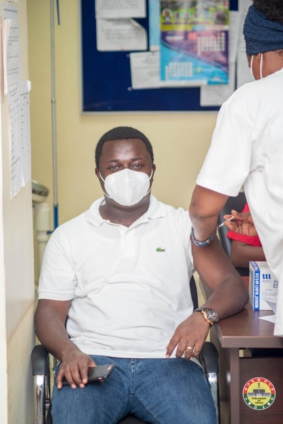The Ghana Health Service (GHS) has urged Ghanaians to participate actively in the second phase of the roll-out of the Covid-19 vaccine.
Speaking to the media, Ashanti Regional Health Director, Emmanuel Tinkorang stressed that the vaccines procured by the government are safe and would ensure immunity against the Coronavirus disease.
“The vaccines are safe and protective despite the negative things you have heard about it. One thing we can assure you as a health system is that, we will make sure we give you a vaccine that is safe and protective and will help you so that you won't die from Covid-19.
“Once you are given your second dose, it means that you have completed your vaccination and as far as your immunity is concerned, it will be high enough to prevent you from the mortality that is associated with Covid-19.” he said.
Ghana is expected to commence its second phase of inoculation on Wednesday, May 19.
The Ashanti Region, he says has received 153,000 doses of AstraZeneca vaccine out of the 350,000 procured by the government for its vaccination exercise.
Although 250,000 persons received their first jab in the region, Mr Tinkorang noted that only persons who were vaccinated between March 2 and 9 would be permitted to receive the second dose this week.
He also stressed that, without vaccination identification cards, persons who arrive at the health facilities would not be attended to.
“If you were vaccinated between March 2 and to 9, it means that you are due for your second dose and whereever you are located, try as much as possible to go to the facility where you were given the first dose to have your second jab.
“The data has been provided to these facilities so when you go, you will be identified. You will have to go with your vaccination cards. Without your vaccination cards, you will not be immunized because your special ID is on the card and that is what we can retrieve,” he stated.
He also used the opportunity to dismiss claims that the AstraZeneca vaccines lead to blood clot.
According to Mr Tinkorang, records in the Ashanti Region do not show reports of such cases. He therefore urged persons to refrain from comparing incidents from other countries to those in Ghana.
“In Ghana, we have not recorded any blood clots. As far as I am concerned, in Ashanti Region, most of them were fever, body pains and others. Those who died, their death cannot be attributed to the vaccine.
“So what is happening in other countries, you cannot use it to describe what is happening in Ghana,” he said.
He further revealed that data from all 16 regions would be analysed by the Pharmaco Vigilance Unit of the Food and Drugs Authority (FDA) and “we will come out with what we call Ghana's situation.
Latest Stories
-
GBC accuses Deputy Information Minister Sylvester Tetteh of demolishing its bungalow illegally
43 seconds -
Boost for education as government commissions 80 projects
12 mins -
NAPO commissions library to honour Atta-Mills’ memory
23 mins -
OmniBSIC Bank champions health and wellness with thriving community walk
25 mins -
Kora Wearables unveils Neo: The Ultimate Smartwatch for Ghana’s tech-savvy and health-conscious users
29 mins -
NDC supports Dampare’s ‘no guns at polling stations’ directive
31 mins -
Police officer interdicted after video of assault goes viral
49 mins -
KNUST’s Prof. Reginald Annan named first African recipient of World Cancer Research Fund
50 mins -
George Twum-Barimah-Adu pledges inclusive cabinet with Minority and Majority leaders
2 hours -
Labourer jailed 5 years for inflicting cutlass wounds on businessman
2 hours -
Parliament urged to fast-track passage of Road Traffic Amendment Bill
2 hours -
Mr Daniel Kofi Asante aka Electrician
2 hours -
Minerals Commission, Solidaridad unveils forum to tackle child labour in mining sector
2 hours -
Election 2024: Engagement with security services productive – NDC
2 hours -
Retain NPP for the good of Ghana – Rebecca Akufo-Addo
2 hours

